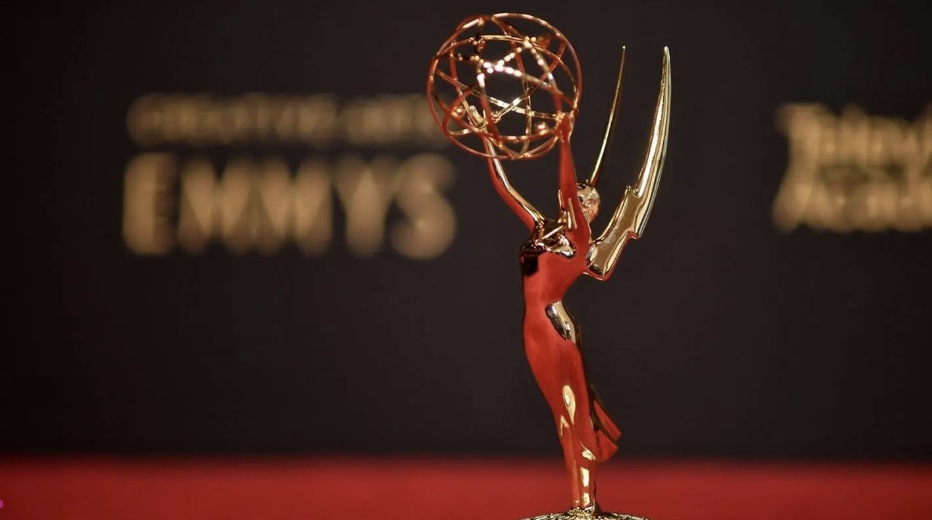The Television Academy hosted the 76th Primetime Emmy Awards on Sept. 15, a night dedicated to honoring the best of television this year. Hosted at the Peacock Theater in Los Angeles, the night was filled with first-time wins, surprising victories and a glimpse into the future of the television industry.
This year’s show, hosted by father-son comedy duo Eugene and Dan Levy, aired nine months after the 75th Emmy Awards, which were pushed back to Jan. 15 due to the WGA and SAG-AFTRA strikes. Despite having two Primetime Emmy Awards in one year, the 76th Emmys saw a 54% increase in total viewers, according to Variety magazine, following a record-low viewership of 4.3 million people during the ceremony earlier this year.
That increase in viewership can be largely attributed to the hosting abilities of Eugene and Dan Levy, who brought a fresh perspective to the worn down award show model. The hosts decided to avoid drawn out bits and crowd work, so the duo kept the show moving while also highlighting iconic actors and shows in new ways.
One refreshing change to this year’s ceremony was the decision to have some awards presented by groups of actors who have each played the same character archetype. These pairings brought a wide variety of performers together in a fun and entertaining way, with one standout group being the “TV Villains” (featuring Antony Starr, Kathy Bates and Giancarlo Esposito) who presented the award for outstanding supporting actress in a limited or anthology series or movie.
Yet as one era ends, another begins. This year’s Emmys brought long-awaited attention to actors and actresses from diverse backgrounds who have gone decades without getting the recognition they deserve.
This year’s changes did not stop with a shift in the show’s organization. The 76th Emmys also marked the first ceremony since 2019 to not feature HBO’s hit drama series “Succession,” which ended in mid-2023 and amassed 19 wins throughout its four seasons.
Other notable behemoths of television that were no longer in the running this year included “The Marvelous Mrs. Maisel” (Amazon Prime), “Better Call Saul” (AMC) and “Barry” (HBO). With Netflix’s “The Crown” also done collecting its final awards, it seems that this year’s Emmy Awards signified the end of an era in television programming.
Yet as one era ends, another begins. This year’s Emmys brought long-awaited attention to actors and actresses from diverse backgrounds who have gone decades without getting the recognition they deserve. Fans of the hit comedy series “New Girl” expressed on the app X, formerly known as Twitter, that they were excited to see actor Lamorne Morris bring in his first nomination and win after years in the industry. Morris won the award for outstanding supporting actor in a limited or anthology series or movie for his work in the latest season of “Fargo” (FX).
Another standout performance last year came from veteran actress Liza Colón-Zayas, who won the award for outstanding supporting actress in a comedy series for her work as Tina in “The Bear” (FX). While viewers were likely not shocked by the awards given to her co-stars Jeremy Allen White and Ebon Moss-Bachrach (who both won last year), Colón-Zayas’s win comes as an exciting surprise for fans of “The Bear.”
Colón-Zayas gave an emotional and empowering acceptance speech following her win, and spoke to those watching who could see themselves in her.
“Thank you to my beautiful cast — Chris Storer, Joanna (Calo) — thank you, thank you, for giving me a new life with this show,” Colón-Zayas said during her acceptance speech. “And to all the Latinas who are looking at me, keep believing and vote. Vote for your rights.”
Amidst recognizing established actors, the 76th Emmy Awards also highlighted fresh talent, new shows, and shed light on the future of the television industry. The critically acclaimed drama “Shōgun,” which aired its first season on FX this year, received a historic 25 nominations and won 18 awards in total.
The show took home the awards for outstanding lead actress in a drama series (won by first-time nominee Anna Sawai), outstanding lead actor in a drama series (given to decorated Japanese actor Hiroyuki Sanada) and outstanding drama series.
“You guys greenlit a very expensive, subtitled, Japanese period piece whose central climax revolves around a poetry competition,” producer Justin Marks said of the executives at FX who decided to fund the show. “I have no idea why you did that, but thank you for your faith in this incredible team … ‘Shōgun’ is a show about translation, not what is lost but what is found.”
By backing shows like “Shōgun,” FX has been able to cement their place as the leading television network. Despite long being considered an underdog of the industry, FX received the most wins of the evening, overtaking their long-standing competitor HBO, as mentioned in Variety magazine. These wins represent a changing television landscape, with new networks that are backing a diverse range of shows rising to the top.
While this year’s Primetime Emmy Awards might have been missing some familiar faces, the evening was rife with new and inspiring talent, and rewarded the networks that were willing to give that talent a chance. Hosts Eugene and Dan Levy, by ushering the show along, let that talent shine.
This year’s Emmys served as a reflection of the ever-changing, diverse, television landscape, proving that the award show model is not exactly dead but must evolve alongside the industry it represents.


